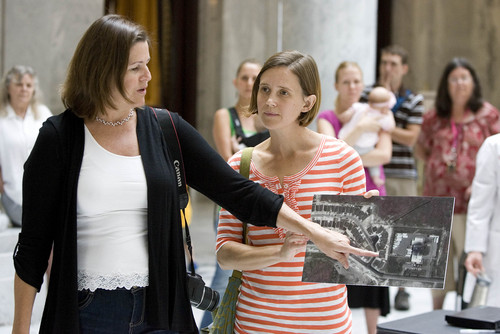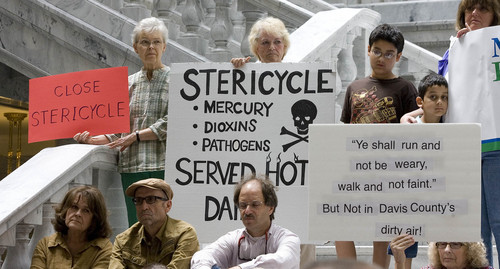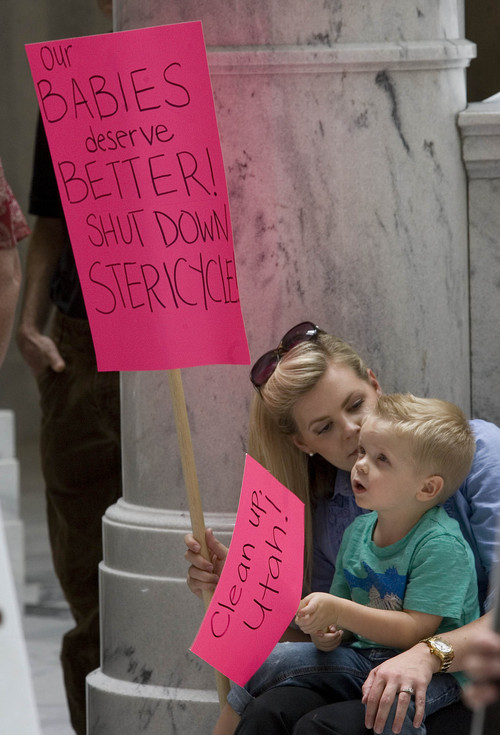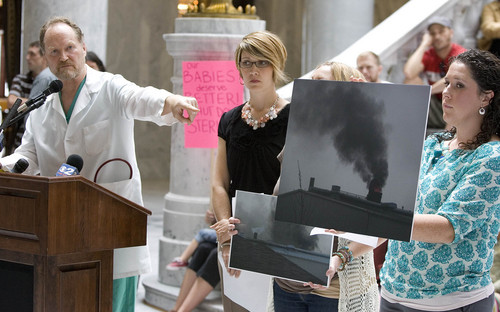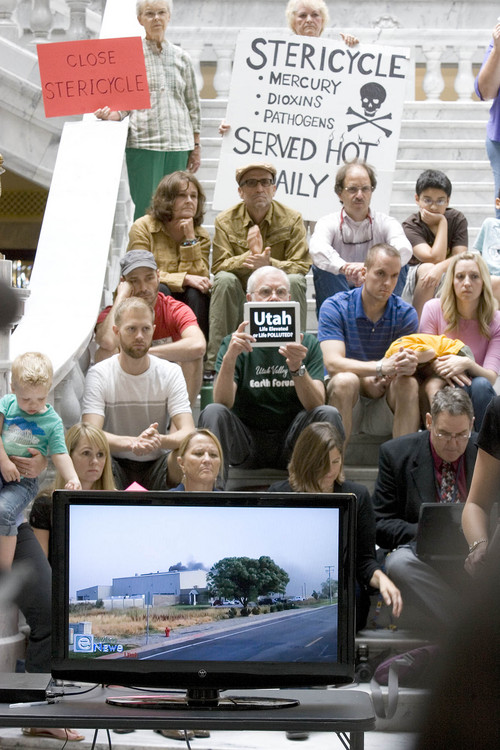This is an archived article that was published on sltrib.com in 2013, and information in the article may be outdated. It is provided only for personal research purposes and may not be reprinted.
Community and public-health activists rallied inside the Utah Capitol on Wednesday, demanding Gov. Gary Herbert shut down the Stericycle medical-waste incinerator, now surrounded by new North Salt Lake subdivisions. They highlighted the company's latest "emergency bypass" event that they say released unfiltered, toxin-laden smoke for up to 10 minutes Friday evening.
When the land around the plant at 100 North and 1100 West was rezoned for residential use in 2003, the community was promised there would be no "upset" emissions from the plant, according to Natasha Hinks-Henderson, a Foxboro resident who lives in a new home one block from the plant. Now homes abut the plant property to the north and the east, yet bypass events happen with alarming frequency, said the mother of two who helped organize Community for Clean Air.
Dioxins, furans and other hazardous air pollutants, or HAPs, in such emissions can harm human health, and children are the most vulnerable, according to Brian Moench of Utah Physicians for a Healthy Environment.
"Given the totality of the evidence, Stericycle should be shut down now, not after months of investigation," he said.
The Utah Department of Environmental Quality (DEQ) recently slapped Stericycle, a large Illinois-based company, with violation notices for exceeding its limits on emissions of nitrogen oxide, as well as dioxins and other hazardous air pollutants.
DEQ has recently revised the notice, imposing stiffer penalties and mandating provisions to deter future violations of emission standards.
"It is a priority to pursue this process with all diligence. In fact, the Division of Air Quality is closely scrutinizing Stericycle to ensure compliance," said DEQ director Amanda Smith. "If Stericycle does not comply with the conditions outlined in the [notice of violation], DEQ will pursue all legal options to revoke its permit."
Plant manager Steven McOmber referred requests for comment to Stericycle's corporate office, which did not immediately return a phone message
In a press statement released shortly after Wednesday's rally, the governor expressed concern over Stericycle's bypass emissions, but it was not clear whether he would use his executive authority to close the plant.
"Our agencies are pursuing penalties to the fullest extent of the law," said Ally Isom, Herbert's deputy chief of staff, in an email to reporters. "With all the state and our partners are doing to improve air quality, it is distressing when one entity [Stericycle] appears less committed to doing its part."
North Salt Lake Mayor Len Arave said the time might be coming when it will be best for Stericycle to cease operations in his community, but he was not willing to endorse his constituents' call to shut down the plant.
Incineration of medical waste is no longer the standard and the vast majority of such facilities have been closed around the nation in recent years.
"While thousands of communities are cleaner, in Utah things have gotten worse," Dr. Ellie Brownstein, a pediatrician, said. That's because hospital waste from eight nearby states is shipped to the North Salt Lake incinerator.
"This is an industry that shouldn't exist. If they were to clean up their act and promise to never do this again, that's still not enough, because the cleanest incinerator there is still a serious public health hazard," Moench said. "The evidence of the public health threat is what's in the blood of the people there. No one is monitoring that. What is in the breast milk of the mothers there? No one is monitoring that."


